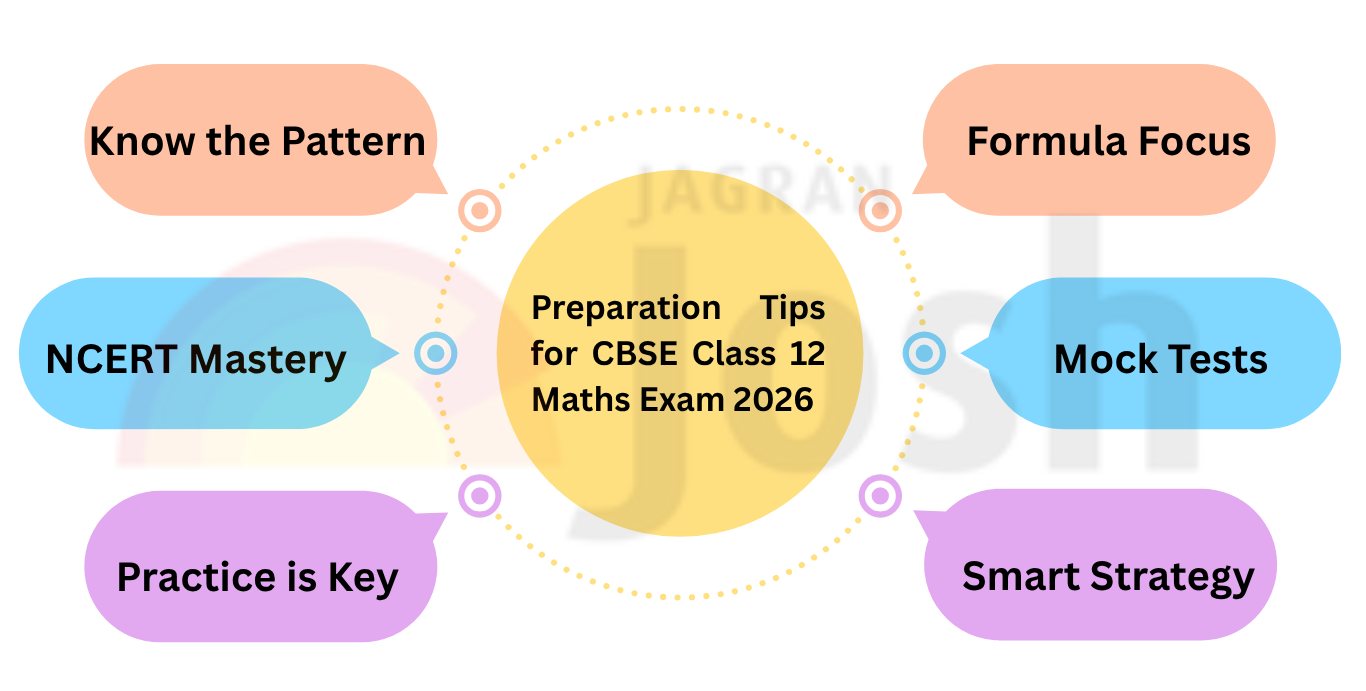CBSE Class 12 Exam Pattern and Marking Scheme 2026: The Central Board of Secondary Education (CBSE) will conduct the Class 12 Maths exam in 2026 based on a specific pattern. Understanding this pattern is crucial for students preparing for their board examinations. The exam will assess various aspects of Maths language and literature, including reading comprehension, writing skills, grammar, and literary analysis.
Students should familiarize themselves with the distribution of marks across different sections and topics to strategize their study plan effectively. The marking scheme provides a detailed breakdown of how marks are allotted for each question, helping students understand the weightage of different answer components. This comprehensive knowledge will enable them to focus on areas that carry more marks and improve their overall performance in the exam.
Check: CBSE Class 12 Maths 5 Month Study Plan for Board Exam 2026
CBSE Class 12 Exam Pattern 2025-26: Key Highlights
CBSE class 12 exam pattern 2025-26 highlights can be checked from the table below:
Particulars | Details |
| Conducting Body | Central Board of Secondary Education |
| Question Paper Pattern |
|
| Duration | 3 Hours |
| Medium | Maths / Hindi |
| Mode | Offline |
| Number of subjects | 5 or 6 (as elected by the student) |
| Maximum Marks | 100 (theory + practical)
|
| Passing marks for each subject | 33% |
| Passing marks for the overall exam | Aggregate 33% |
CBSE Class 12 Maths: Chapter-Wise Exam Pattern & Marking Scheme
The CBSE Class 12 Mathematics exam is divided into an 80-mark theory paper and a 20-mark internal assessment. The chapter-wise exam pattern and marking scheme for Mathematics are detailed below.
Topic | Marks |
| Relations & Functions | 08 |
| Calculus | 35 |
| Algebra | 10 |
| Vectors & 3-Dimensional Geometry | 14 |
| Linear Programming | 05 |
| Probability | 08 |
CBSE Class 12 Exam Pattern Maths
The table below details the distribution of marks based on the typology of questions for the CBSE Class 12 Maths exam. This provides insights into the cognitive skills assessed and their respective weightage.
Typology of Questions | Total Marks | % Weightage |
| Remembering: Exhibit memory of previously learned material by recalling facts, terms, basic concepts, and answers. | 44 | 55 |
| Understanding: Demonstrate understanding of facts and ideas by organizing, comparing, translating, interpreting, giving descriptions, and stating main ideas | ||
| Applying: Solve problems to new situations by applying acquired knowledge, facts, techniques and rules in a different way. | 20 | 25 |
| Analysing: Examine and break information into parts by identifying motives or causes. Make inferences and find evidence to support generalizations | ||
| Evaluating: Present and defend opinions by making judgments about information, the validity of ideas, or the quality of work based on a set of criteria. | 16 | 20 |
| Creating: Compile information together in a different way by combining elements in a new pattern or proposing alternative solutions | ||
| Total | 80 | 100 |
Preparation Tips for CBSE Class 12 Maths Exam 2026

-
Know the Pattern: Note that Calculus (35 Marks) has the highest weightage. Competency-Based Questions (CBA) now make up nearly 50% of the paper, focusing on application, not rote learning.
-
NCERT Mastery: Solve every single example and exercise from the NCERT textbook. It is the primary source for board questions.
-
Practice is Key: Dedicate daily time to solving problems. Maths requires muscle memory, not just reading.
-
Formula Focus: Maintain a concise formula sheet (especially for Integration, Differentiation, and 3D Geometry) and revise it daily for quick recall during the exam.
-
Mock Tests: Take timed mock tests (3 hours) frequently. This improves your speed, accuracy, and helps you practice the CBA format under pressure.
-
Smart Strategy: During the exam, show step-by-step solutions (for partial credit) and leave 15–20 minutes at the end for thorough review.
This structured approach to the CBSE Class 12 Maths exam, combined with internal assessments. By understanding the topic-wise weightage and adhering to these preparation tips, students can effectively strategize their studies and maximize their scores.
Also Check:
Comments
All Comments (0)
Join the conversation